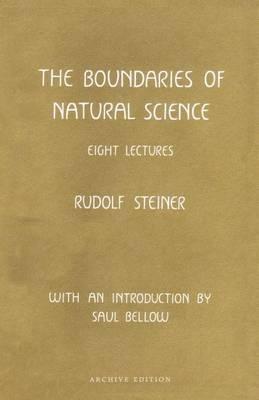Overview
8 lectures, Dornach, Sep-Oct, 1920 (CW 322)""We must begin by acquiring the discipline that modern science can teach us. We must school ourselves in this way and then, taking the strict methodology, the scientific discipline we have learned from modern natural science, transcend it, so that we use the same exacting approach to rise into higher regions, thereby extending this methodology to the investigation of entirely different realms as well."" --Rudolf SteinerIf only sensory phenomena are within the reach of scientific research, the doors are closed to those worlds from which the human being originates and where the creative forces of the world are found. Rudolf Steiner challenges us to develop organs of perception needed to go beyond these limits of perception, so that we can witness the spirit that is active in all natural phenomena.Read Bobby Matherne's review of this book
Full Product Details
Author: Rudolf Steiner ,
F. Amrine ,
K. Oberhuber
Publisher: Anthroposophic Press Inc
Imprint: SteinerBooks, Inc
Dimensions:
Width: 13.70cm
, Height: 1.00cm
, Length: 22.00cm
Weight: 0.227kg
ISBN: 9780880101875
ISBN 10: 0880101873
Pages: 127
Publication Date: 01 June 1987
Audience:
General/trade
,
General
Format: Paperback
Publisher's Status: Active
Availability: Available To Order

We have confirmation that this item is in stock with the supplier. It will be ordered in for you and dispatched immediately.
Language: German
Author Information
Rudolf Steiner (b. Rudolf Joseph Lorenz Steiner, 1861-1925) was born in the small village of Kraljevec, Austro-Hungarian Empire (now in Croatia), where he grew up. As a young man, he lived in Weimar and Berlin, where he became a well-published scientific, literary, and philosophical scholar, known especially for his work with Goethe's scientific writings. Steiner termed his spiritual philosophy anthroposophy, meaning ""wisdom of the human being."" As an exceptionally developed seer, he based his work on direct knowledge and perception of spiritual dimensions. He initiated a modern, universal ""spiritual science"" that is accessible to anyone willing to exercise clear and unbiased thinking. From his spiritual investigations, Steiner provided suggestions for the renewal of numerous activities, including education (general and for special needs), agriculture, medicine, economics, architecture, science, philosophy, Christianity, and the arts. There are currently thousands of schools, clinics, farms, and initiatives in other fields that involve practical work based on the principles Steiner developed. His many published works feature his research into the spiritual nature of human beings, the evolution of the world and humanity, and methods for personal development. He wrote some thirty books and delivered more than six thousand lectures throughout much of Europe. In 1924, Steiner founded the General Anthroposophical Society, which today has branches around the world. Saul Bellow (born Solomon Bellows, 1915-2005) was a Canadian-American writer born in Lachine, Quebec. For his literary work, Bellow was awarded the Pulitzer Prize, the Nobel Prize for Literature, and the National Medal of Arts. He was the only writer to win the National Book Award for Fiction three times, and he received the National Book Foundation's lifetime Medal for Distinguished Contribution to American Letters in 1990. His best-known works are The Adventures of Augie March (1953), Henderson the Rain King (1959), Seize the Day (1956), Herzog (1964), Mr. Sammler's Planet (1970), Humboldt's Gift (1975), and Ravelstein (2000). Frederick Amrine is associate professor of German at the University of Michigan. He holds advanced degrees from Cambridge University and Harvard. His publications include Goethe and the Sciences: A Reappraisal, The Bildungsroman, and Literature and Science as Modes of Expression. He has translated several works by Rudolf Steiner.



